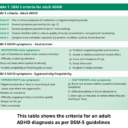Finding the right medication dose for a patient with ADHD often requires some adjustments. This process of treatment…
Blog
Better conversations, better ADHD care: How to support long-term success
Success in ADHD care isn’t just about reducing symptoms; it’s about long-term improvements in a patient’s outcomes. The…

How multi-disciplinary teams are improving ADHD diagnosis
ADHD is a complex condition, and patients often have comorbid conditions such as autism or anxiety. This can…

The ADHD test that does the talking for you: communicate effectively with your patients
Conversations with patients about test results, treatment options, and long-term success are often pivotal to the success of…

Digital ADHD assessments in 2025 – A new standard for clinical accuracy?
Technology is changing how health conditions like ADHD are diagnosed and treated. It’s an area of rapid innovation,…

Inside an ADHD center of excellence – what gold standard really looks like
For many adults, the journey to an ADHD diagnosis can be long and frustrating. Symptoms are sometimes misattributed,…

Defining quality in ADHD care: metrics every clinic should track
Providing the highest standard of care for ADHD patients is at the core of clinicians’ goals. However, without…

Is ADHD on the rise? What the latest data tells us
There’s been a noticeable rise in media and public interest in ADHD in recent years. A 2024 YouGov…

What the NHS ADHD Taskforce report means for clinicians
Summary – What clinicians need to know The NHS England ADHD Taskforce has released its Interim Report on…

DSM-5 and ADHD: What changed, what’s missing, and what clinicians must know
The Diagnostic and Statistical Manual of Mental Disorders (DSM) was first introduced in the 1950s. It has shaped…

